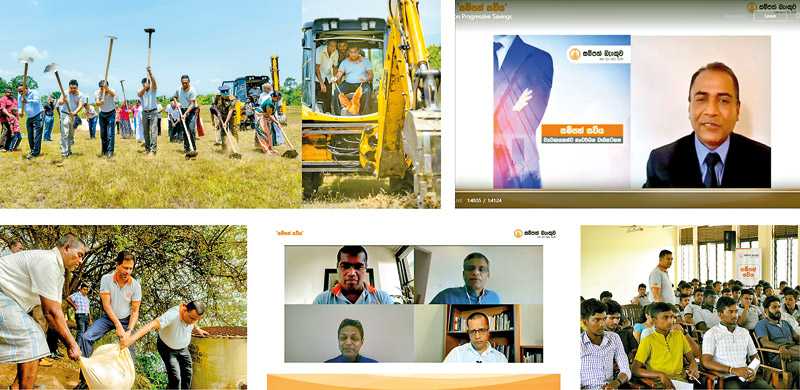Sunday Feb 15, 2026
Sunday Feb 15, 2026
Thursday, 24 December 2020 00:01 - - {{hitsCtrl.values.hits}}

Clockwise from top left are some of Sampath Bank’s community outreach efforts in 2020 namely, the Kindagalle Tank ground-breaking ceremony, a customer webinar on progressive savings, a workshop held at Technical College – Polonnaruwa, scenes from a webinar for SMEs on creating a positive business mind-set and the inauguration ceremony of the Nelawagama Tank
As a bank that takes pride in its Sri Lankan roots, Sampath Bank carried out several sustainability initiatives throughout the year aimed at community development, environmental protection and helping individuals and small businesses recover from the negative impacts caused by COVID-19. During this challenging year, the bank was not only able to deliver on its ongoing commitments but even initiated new projects to help revive the nation.
Key among these projects was the continuation of its ‘Wewata Jeewayak’ program, which commenced in 2001 as a part of its community capacity-building initiatives. It also hopes to promote organic farming as a viable means of maintaining a sustainable livelihood through agriculture. Furthermore, this project contributes to the Bank’s triple bottom line as it enriches the lives of the community in the area, improves the water capacity of the tank and develops the surrounding eco-system, and empowers agri-entrepreneurs by making them financially inclusive.
This year Sampath Bank undertook two tank restoration projects under the program. The first was to restore the Kindagalle tank, located in the Kokunnewa area of Bibile in the Monaragala district, which has a surface area of 15 acres and currently provides water to 62 acres of paddy land, benefitting 60 farmer families. Post restoration the tank will supply 262 acres of farming land with water, thereby directly benefiting 260 families. The restoration work includes excavation of the tank and rebuilding of the tank bund and spill, all of which is being carried out under the supervision and technical expertise of the Agrarian Development Department in Monaragala.
The second tank on which restoration work began was the Nalawagama Tank located at Nalawa village, Nochchiyagama in the Anuradhapura district. The tank has a surface area of 175 acres and currently provides water to 210 acres of paddy land, benefitting 175 families. Under the restoration, the tank’s sluice gates were completely replaced as this was identified by the bank as an urgent need. Before the restoration, the only way in which the gate could be opened or closed involved diving into over 10 feet of water, at great risk to the farmers’ lives.
In response to the COVID-19 pandemic, the bank partnered with the CBL Group and WSO2 and jointly donated a state-of-the-art PCR laboratory to the Army Hospital in Colombo at a cost of approximately Rs. 32 million. The lab has a testing capacity of 600 samples per day, thereby expanding the national capacity to conduct PCR tests, which will enable health authorities to expand their testing base, identify those infected and provide treatment.
The Bank also conducted webinars under its ‘Sampath Saviya’ entrepreneurship development programme to offer advice to SMEs on how best to recover from the impact of the COVID-19 pandemic as well as to undergraduates of the Rajarata University of Sri Lanka to help convert job seekers into job creators. These webinars, facilitated by top professionals and bank officers, were conducted free of charge, and attended by more than 500 participants. This was in addition to the Bank conducting workshops for students and career guidance officers of technical colleges that fall under the purview of the Department of Technical Education and Training, as well as a webinar for its customers on progressive savings and financial knowledge for everyday life.
In line with its commitment to environmental consciousness, Sampath Bank published its Integrated Annual Report for 2019 as a carbon neutral product for the fifth consecutive year by offsetting its carbon footprint of 20.58 tCO2e via the purchase of United Nations Certified Emission Reductions (CERs). Sampath Bank calculates and reports its carbon footprint on an annual basis and promotes emission reduction initiatives such as paper recycling and energy saving.
In May 2018, the Bank initiated a Biodiversity Conservation Project which is still ongoing and aims to set up a biodiversity baseline and management plan to restore a degraded forest patch of one hectare in Halgahawala, Opatha and revive the surrounding ecosystem. This five-year project is operationalised through a MOU between Sampath Bank and Biodiversity Sri Lanka (BSL), with technical inputs from the International Union for Conservation of Nature (IUCN) and the Forest Department of Sri Lanka. Currently 10,000 plants have been grown at the site, out of a total of 30,000 plants required to repopulate the area.
An ongoing initiative has been in place for the past 26 years, where for every new Sampath Bank debit card issued, the bank has undertaken to contribute a sum to the Wildlife and Nature Protection Society of Sri Lanka (WNPS).
Sampath Bank’s sustainability initiatives display a strong commitment to serve the community and generate viable benefits for the country and its citizens while supporting the sustainable development goals set by the United Nations. The bank considers this to be an ingrained aspect of its operations and has constantly gone above and beyond the natural obligations which govern its activities in the ordinary course of business. With proven expertise and professionalism in banking and finance, the bank’s efforts will be central towards economic development and the growth of individuals and society at large.